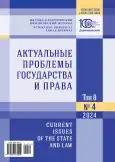State worldview as an alternative to ideology
- Authors: BORISOVA N.E.1
-
Affiliations:
- Moscow City University
- Issue: Vol 8, No 4 (2024)
- Pages: 510-519
- Section: Issues of Private and Public Law
- URL: https://journal-vniispk.ru/2587-9340/article/view/303465
- ID: 303465
Cite item
Abstract
Substantiates the need to ensure the unity of the foundations of the constitutional system due to the weakness of the definition of the cultural and spiritual block of its components, which seems necessary as a fixation of the main vectors of the development of the Russian state. The problem is revealed taking into account its significance in the context of upbringing and formation of the younger generation. We argue for the importance of constitutional provisions that consolidate traditional national values, as a result of which it is concluded that, in its essential meaning, the amendments made to the Constitution containing traditional spiritual and moral values can be considered as the cultural and spiritual foundations of the constitutional system of modern Russia. The connection between the content of constitutionally fixed spiritual values and the need for their concretization, formulation and implementation into the consciousness and behavior of people, education of commitment to them, which is the essence of ideological work, as well as activities to form a state worldview, is proved. The research methodology is based on the dialectical-materialistic method of cognition of reality in the context of the post-non-classical stage of the development of science, where the individuality of the researcher and his values are most evident, using an interdisciplinary approach, comparative analysis and historicism. Considering the state worldview in relation to the concepts of the ideology of the state and constitutional ideology, we come to the conclusion that constitutional spiritual and moral values, which have absorbed the entire long-term experience of Russian civilization, perceived by the majority of the population, which in their development become the goal of the state, coupled with a single unifying, unifying multinational country idea, will constitute fundamentals of the state worldview.
About the authors
Natalia E. BORISOVA
Moscow City University
Author for correspondence.
Email: ne0609@bk.ru
ORCID iD: 0000-0002-6491-1829
Dr. Sci. (Law), Professor, Professor of Law Department, Institute of Economics, Management and Law
Russian Federation, 1 bldg 4 2-nd Selskohozoyastvenny Dr., Moscow, 129226, Russian FederationReferences
- Borisova N.E., Gavrilova Yu.V., Korchagina T.V., Ponomarev M.V. (2023). The role of legal socialization and the formation of constitutional culture in the system of patriotic students’ education. Vestnik MGPU. Seriya «Yuridicheskie nauki» = MCU Journal of Legal Sciences, no. 4 (52), pp. 64-76. (In Russ.) https://doi.org/10.25688/2076-9113.2023.52.4.06, https://elibrary.ru/thuspc
- Avak’yan S.A. (2000). The Constitution of Russia: Nature, Evolution, Modernity. Moscow, RYUID, “Sashko” Publ., 528 p. (In Russ.)
- Gritsanov A.A. (academ. ed.). (2001). World Encyclopedia: Philosophy. Moscow, Kharvest, Sovremennyi literator Publ., 1311 p. (In Russ.) https://elibrary.ru/ypqlos
- Borodulin V.I. (ed.). (2001). New Illustrated Encyclopedic Dictionary. Moscow, Bol’shaya rossiiskaya entsiklopediya Publ., 912 p. (In Russ.)
- Borisova N.E. (2023). Legal education in the paradigm of the state worldview. Sbornik materialov konferentsii «Detstvo – territoriya bezopasnosti» = Collection of Conference Materials “Childhood Is A Territory Of Safety”. Moscow, “Saratovskii istochnik” Publ., 508 p. (In Russ.) https://elibrary.ru/chuvza
- Kharichev A.D., Shutov A.Yu., Polosin A.V., Sokolova E.N. (2022). Perception of basic values, factors and structures socio-historical development of Russia (based on research and testing materials). Zhurnal politicheskikh issledovanii = Journal of Political Research, no. 3, pp. 9-19. (In Russ.) https://doi.org/10.12737/2587-6295-2022-6-3-9-19, https://elibrary.ru/egeabu
- Lenin V.I. (1963). What to do. In: Lenin V.I. Complete Set of Works. Moscow, State Publisher of Political Literature, vol. 9, pp. 39-40. (In Russ.)
- Makarenko A.S. (1986). Pedagogical Poem: Novel. Moscow, Moskovskii rabochii Publ., 639 p. (In Russ.)
- Pashentsev D.A. (2021). Historical legal science challenged by postnonclassical scientific rationality. Istoriya gosudarstva i prava = History of State and Law, no. 3, pp. 75-80. (In Russ.) https://doi.org/10.18572/1812-3805-2021-3-75-80, https://elibrary.ru/ypnhox
- Al’bov A.P. (compiler). (1997). Russian Philosophy of Law: Philosophy of Faith and Morality. St. Peresburg, Aleteiya Publ., 435 p. (In Russ.)
Supplementary files








